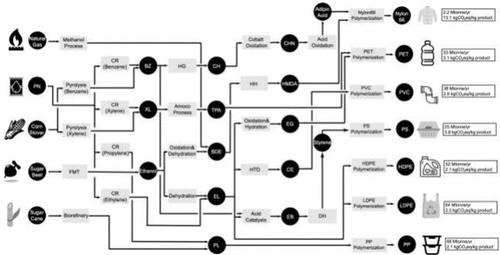当前位置:
X-MOL 学术
›
ACS Sustain. Chem. Eng.
›
论文详情
Our official English website, www.x-mol.net, welcomes your
feedback! (Note: you will need to create a separate account there.)
A Pathway Analysis Framework for Evaluating the Economic and Environmental Viability of Biomass-Based Plastic Production
ACS Sustainable Chemistry & Engineering ( IF 7.1 ) Pub Date : 2024-11-07 , DOI: 10.1021/acssuschemeng.4c06551 Bo-Xun Wang, Jiqing Zhuang, Victor M. Zavala
ACS Sustainable Chemistry & Engineering ( IF 7.1 ) Pub Date : 2024-11-07 , DOI: 10.1021/acssuschemeng.4c06551 Bo-Xun Wang, Jiqing Zhuang, Victor M. Zavala

|
Plastic production from fossil feedstocks (e.g., naphtha, coal, and natural gas) is not sustainable and causes known environmental impacts such as global warming. A possible solution is to shift production pathways to use biomass, which is a sustainable feedstock that can sequester atmospheric carbon dioxide. This study presents an optimization-based pathway analysis framework for evaluating the carbon footprints of the production of mainstream plastics from biomass and fossil feedstocks. We use the modeling framework to quickly navigate complex interdependencies that exist between the production pathways of different plastics and to determine pathways of minimum production cost under a range of carbon pricing scenarios. The framework interprets carbon prices as an exogenous taxation scheme or an endogenous negative value perceived by producers. The proposed approach reveals the biomass feedstock quantities needed to displace fossil counterparts and the plastics and technologies that should be prioritized. The framework can also be used for evaluating system-wide trade-offs between production costs and carbon footprints that arise from pathway interdependencies. We also evaluate hidden environmental impacts associated with the large-scale use of biomass as a feedstock, such as land use and water eutrophication that results from a significant increase in fertilizer use. Therefore, it is important to highlight that there are trade-offs between decarbonization and other environmental issues. The proposed framework provides an integrative platform for basic techno-economic and life-cycle data that can be used for analyzing diverse scenarios and determining necessary technology targets (e.g., yields, footprints, and costs) to achieve required levels of decarbonization.
中文翻译:

评估生物质塑料生产的经济和环境可行性的途径分析框架
使用化石原料(例如石脑油、煤炭和天然气)生产塑料是不可持续的,并会导致已知的环境影响,例如全球变暖。一个可能的解决方案是改变生产途径,使用生物质,这是一种可持续的原料,可以封存大气中的二氧化碳。本研究提出了一个基于优化的途径分析框架,用于评估从生物质和化石原料生产主流塑料的碳足迹。我们使用建模框架来快速导航不同塑料生产路径之间存在的复杂相互依赖关系,并确定在一系列碳定价情景下的最低生产成本路径。该框架将碳价格解释为生产者感知的外生税收计划或内生负值。所提出的方法揭示了取代化石燃料所需的生物质原料数量以及应优先考虑的塑料和技术。该框架还可用于评估生产成本和路径相互依存性产生的碳足迹之间的系统范围权衡。我们还评估了与大规模使用生物质作为原料相关的隐藏环境影响,例如土地使用和肥料使用量显着增加导致的水富营养化。因此,重要的是要强调脱碳和其他环境问题之间存在权衡取舍。拟议的框架为基本技术经济和生命周期数据提供了一个集成平台,可用于分析各种情景并确定必要的技术目标(例如,产量、足迹和成本)以实现所需的脱碳水平。
更新日期:2024-11-07
中文翻译:

评估生物质塑料生产的经济和环境可行性的途径分析框架
使用化石原料(例如石脑油、煤炭和天然气)生产塑料是不可持续的,并会导致已知的环境影响,例如全球变暖。一个可能的解决方案是改变生产途径,使用生物质,这是一种可持续的原料,可以封存大气中的二氧化碳。本研究提出了一个基于优化的途径分析框架,用于评估从生物质和化石原料生产主流塑料的碳足迹。我们使用建模框架来快速导航不同塑料生产路径之间存在的复杂相互依赖关系,并确定在一系列碳定价情景下的最低生产成本路径。该框架将碳价格解释为生产者感知的外生税收计划或内生负值。所提出的方法揭示了取代化石燃料所需的生物质原料数量以及应优先考虑的塑料和技术。该框架还可用于评估生产成本和路径相互依存性产生的碳足迹之间的系统范围权衡。我们还评估了与大规模使用生物质作为原料相关的隐藏环境影响,例如土地使用和肥料使用量显着增加导致的水富营养化。因此,重要的是要强调脱碳和其他环境问题之间存在权衡取舍。拟议的框架为基本技术经济和生命周期数据提供了一个集成平台,可用于分析各种情景并确定必要的技术目标(例如,产量、足迹和成本)以实现所需的脱碳水平。


















































 京公网安备 11010802027423号
京公网安备 11010802027423号